Report on Unit 25: Support Work in Health and Social Care
VerifiedAdded on 2020/06/04
|6
|1367
|41
Report
AI Summary
This report delves into the critical role of support work within the health and social care sector, emphasizing the contributions of non-direct care workers. It explores their diverse responsibilities, including administrative tasks, maintenance, security, and catering, and how these roles collectively enhance the efficiency and quality of care. The report highlights the significance of interpersonal skills, teamwork, and the maintenance of health, safety, and security within care environments. Furthermore, it underscores the importance of effective supervision and management in the development and performance of non-direct care workers, referencing relevant legislation and work practices. The conclusion emphasizes the necessity of support work for the overall betterment of health and social care services.
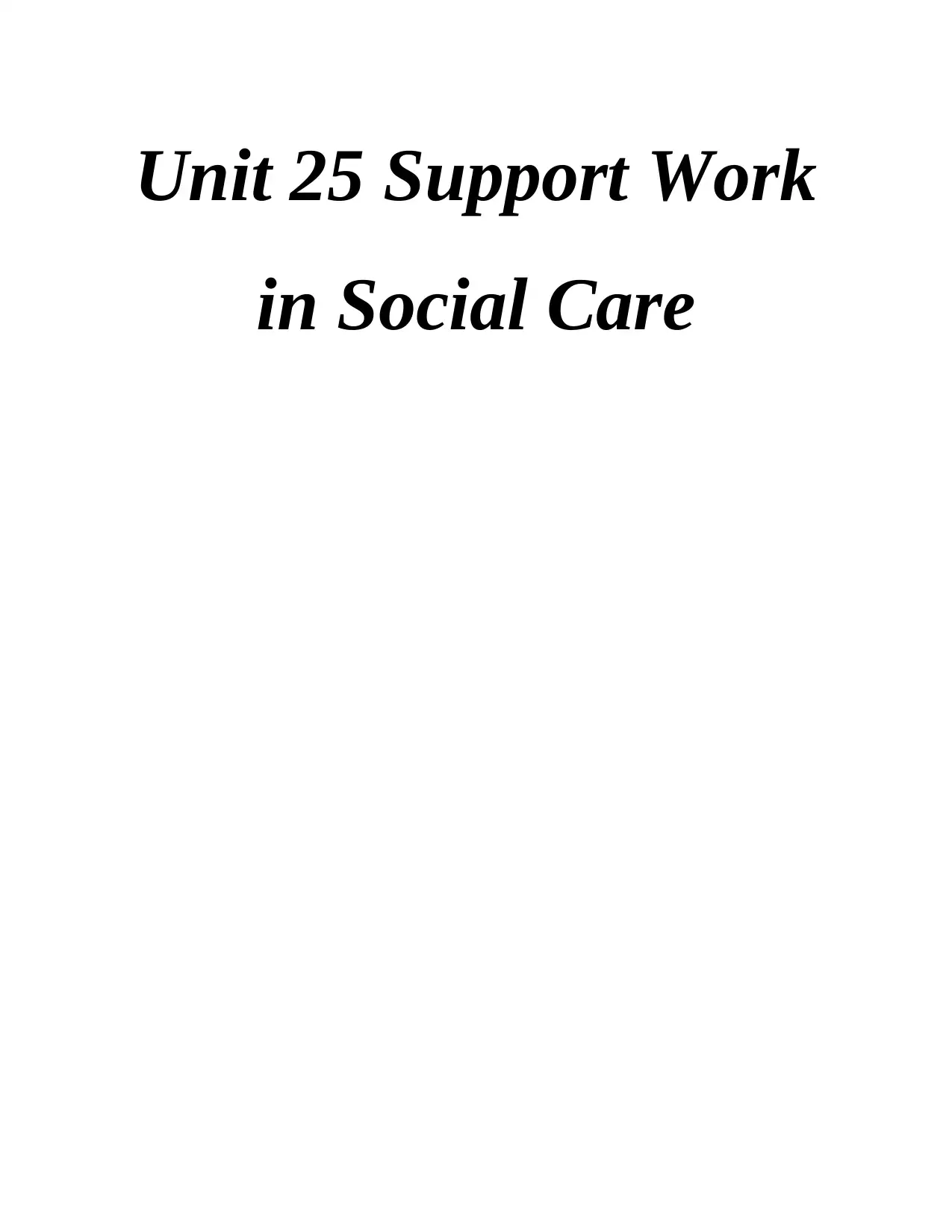
Unit 25 Support Work
in Social Care
in Social Care
Paraphrase This Document
Need a fresh take? Get an instant paraphrase of this document with our AI Paraphraser
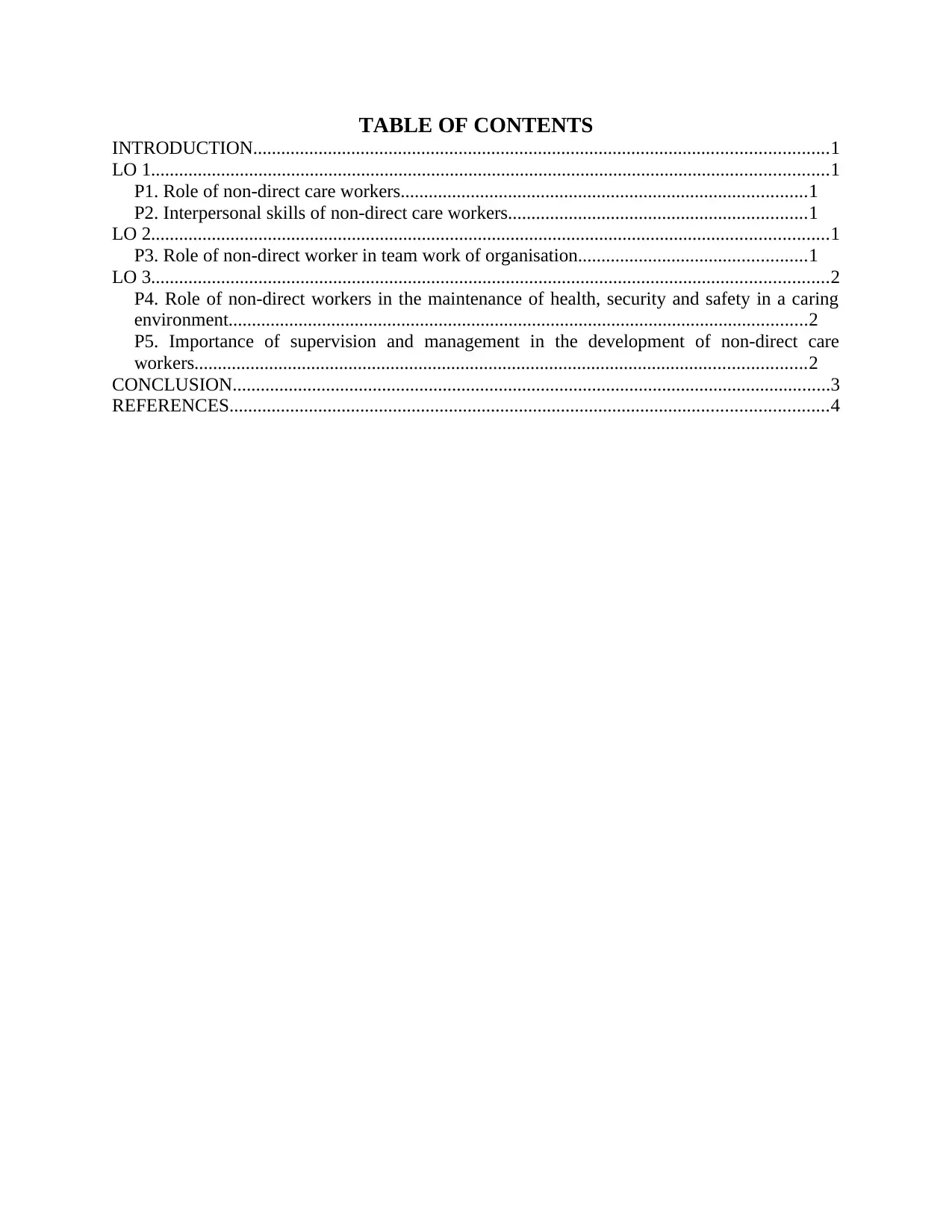
TABLE OF CONTENTS
INTRODUCTION...........................................................................................................................1
LO 1.................................................................................................................................................1
P1. Role of non-direct care workers.......................................................................................1
P2. Interpersonal skills of non-direct care workers................................................................1
LO 2.................................................................................................................................................1
P3. Role of non-direct worker in team work of organisation.................................................1
LO 3.................................................................................................................................................2
P4. Role of non-direct workers in the maintenance of health, security and safety in a caring
environment............................................................................................................................2
P5. Importance of supervision and management in the development of non-direct care
workers...................................................................................................................................2
CONCLUSION................................................................................................................................3
REFERENCES................................................................................................................................4
INTRODUCTION...........................................................................................................................1
LO 1.................................................................................................................................................1
P1. Role of non-direct care workers.......................................................................................1
P2. Interpersonal skills of non-direct care workers................................................................1
LO 2.................................................................................................................................................1
P3. Role of non-direct worker in team work of organisation.................................................1
LO 3.................................................................................................................................................2
P4. Role of non-direct workers in the maintenance of health, security and safety in a caring
environment............................................................................................................................2
P5. Importance of supervision and management in the development of non-direct care
workers...................................................................................................................................2
CONCLUSION................................................................................................................................3
REFERENCES................................................................................................................................4
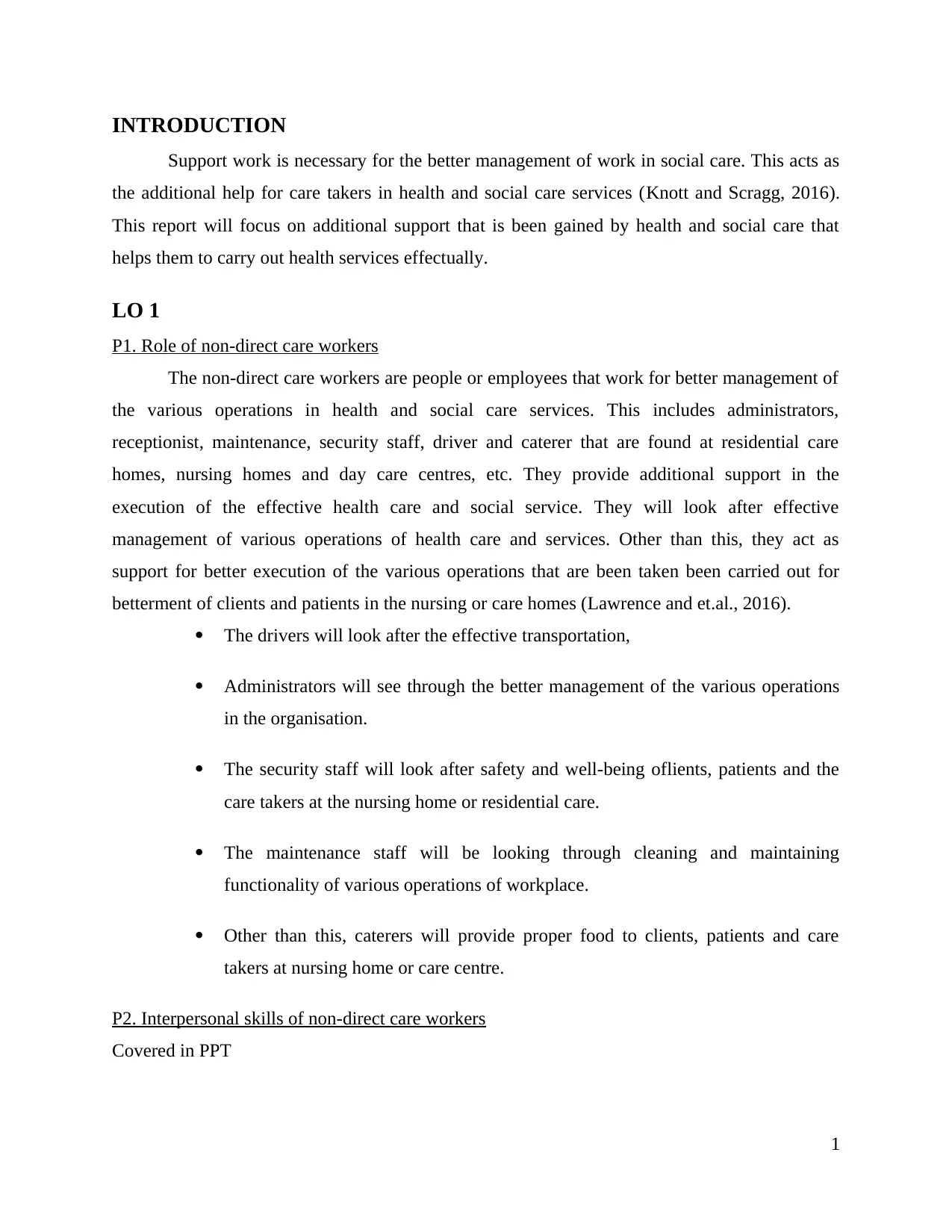
INTRODUCTION
Support work is necessary for the better management of work in social care. This acts as
the additional help for care takers in health and social care services (Knott and Scragg, 2016).
This report will focus on additional support that is been gained by health and social care that
helps them to carry out health services effectually.
LO 1
P1. Role of non-direct care workers
The non-direct care workers are people or employees that work for better management of
the various operations in health and social care services. This includes administrators,
receptionist, maintenance, security staff, driver and caterer that are found at residential care
homes, nursing homes and day care centres, etc. They provide additional support in the
execution of the effective health care and social service. They will look after effective
management of various operations of health care and services. Other than this, they act as
support for better execution of the various operations that are been taken been carried out for
betterment of clients and patients in the nursing or care homes (Lawrence and et.al., 2016).
The drivers will look after the effective transportation,
Administrators will see through the better management of the various operations
in the organisation.
The security staff will look after safety and well-being oflients, patients and the
care takers at the nursing home or residential care.
The maintenance staff will be looking through cleaning and maintaining
functionality of various operations of workplace.
Other than this, caterers will provide proper food to clients, patients and care
takers at nursing home or care centre.
P2. Interpersonal skills of non-direct care workers
Covered in PPT
1
Support work is necessary for the better management of work in social care. This acts as
the additional help for care takers in health and social care services (Knott and Scragg, 2016).
This report will focus on additional support that is been gained by health and social care that
helps them to carry out health services effectually.
LO 1
P1. Role of non-direct care workers
The non-direct care workers are people or employees that work for better management of
the various operations in health and social care services. This includes administrators,
receptionist, maintenance, security staff, driver and caterer that are found at residential care
homes, nursing homes and day care centres, etc. They provide additional support in the
execution of the effective health care and social service. They will look after effective
management of various operations of health care and services. Other than this, they act as
support for better execution of the various operations that are been taken been carried out for
betterment of clients and patients in the nursing or care homes (Lawrence and et.al., 2016).
The drivers will look after the effective transportation,
Administrators will see through the better management of the various operations
in the organisation.
The security staff will look after safety and well-being oflients, patients and the
care takers at the nursing home or residential care.
The maintenance staff will be looking through cleaning and maintaining
functionality of various operations of workplace.
Other than this, caterers will provide proper food to clients, patients and care
takers at nursing home or care centre.
P2. Interpersonal skills of non-direct care workers
Covered in PPT
1
⊘ This is a preview!⊘
Do you want full access?
Subscribe today to unlock all pages.

Trusted by 1+ million students worldwide
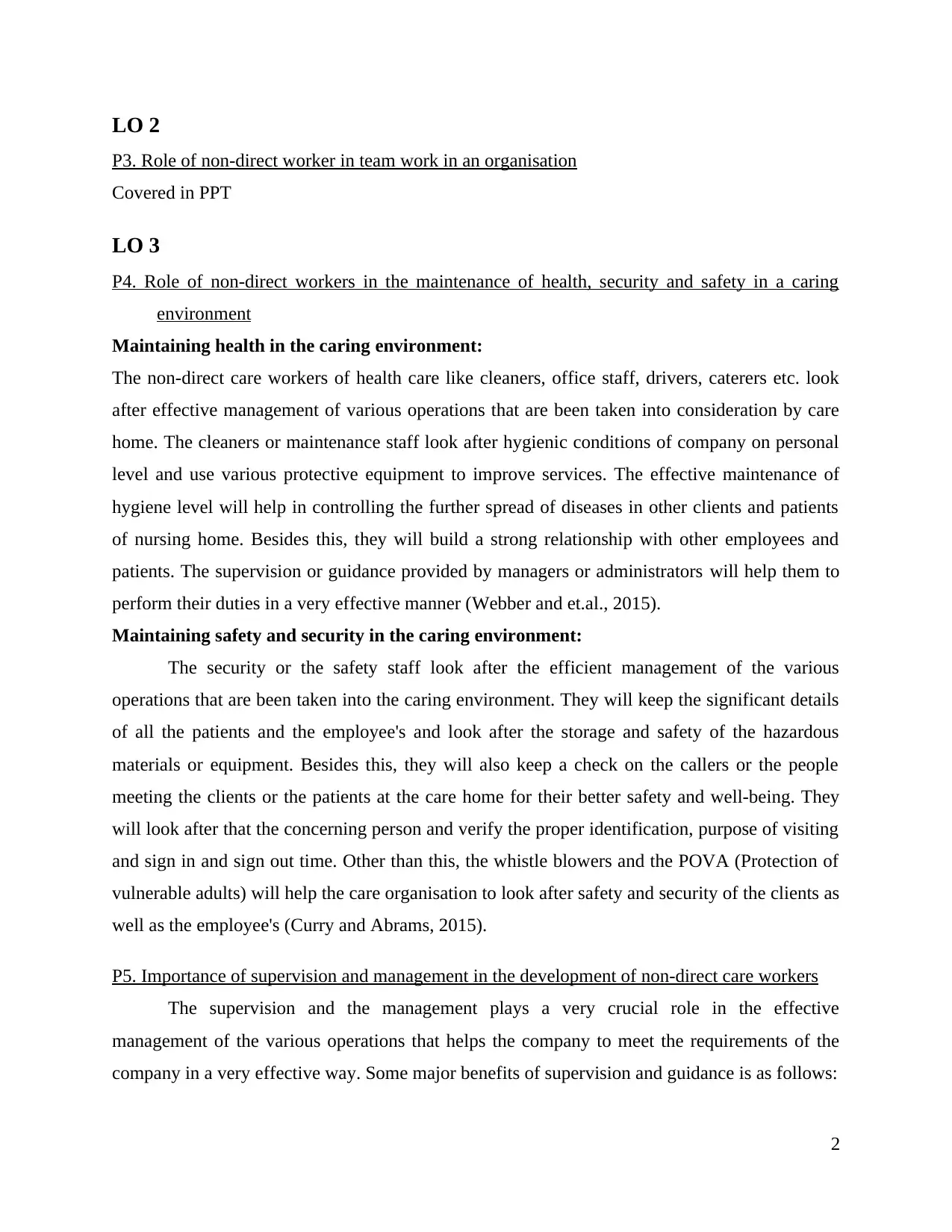
LO 2
P3. Role of non-direct worker in team work in an organisation
Covered in PPT
LO 3
P4. Role of non-direct workers in the maintenance of health, security and safety in a caring
environment
Maintaining health in the caring environment:
The non-direct care workers of health care like cleaners, office staff, drivers, caterers etc. look
after effective management of various operations that are been taken into consideration by care
home. The cleaners or maintenance staff look after hygienic conditions of company on personal
level and use various protective equipment to improve services. The effective maintenance of
hygiene level will help in controlling the further spread of diseases in other clients and patients
of nursing home. Besides this, they will build a strong relationship with other employees and
patients. The supervision or guidance provided by managers or administrators will help them to
perform their duties in a very effective manner (Webber and et.al., 2015).
Maintaining safety and security in the caring environment:
The security or the safety staff look after the efficient management of the various
operations that are been taken into the caring environment. They will keep the significant details
of all the patients and the employee's and look after the storage and safety of the hazardous
materials or equipment. Besides this, they will also keep a check on the callers or the people
meeting the clients or the patients at the care home for their better safety and well-being. They
will look after that the concerning person and verify the proper identification, purpose of visiting
and sign in and sign out time. Other than this, the whistle blowers and the POVA (Protection of
vulnerable adults) will help the care organisation to look after safety and security of the clients as
well as the employee's (Curry and Abrams, 2015).
P5. Importance of supervision and management in the development of non-direct care workers
The supervision and the management plays a very crucial role in the effective
management of the various operations that helps the company to meet the requirements of the
company in a very effective way. Some major benefits of supervision and guidance is as follows:
2
P3. Role of non-direct worker in team work in an organisation
Covered in PPT
LO 3
P4. Role of non-direct workers in the maintenance of health, security and safety in a caring
environment
Maintaining health in the caring environment:
The non-direct care workers of health care like cleaners, office staff, drivers, caterers etc. look
after effective management of various operations that are been taken into consideration by care
home. The cleaners or maintenance staff look after hygienic conditions of company on personal
level and use various protective equipment to improve services. The effective maintenance of
hygiene level will help in controlling the further spread of diseases in other clients and patients
of nursing home. Besides this, they will build a strong relationship with other employees and
patients. The supervision or guidance provided by managers or administrators will help them to
perform their duties in a very effective manner (Webber and et.al., 2015).
Maintaining safety and security in the caring environment:
The security or the safety staff look after the efficient management of the various
operations that are been taken into the caring environment. They will keep the significant details
of all the patients and the employee's and look after the storage and safety of the hazardous
materials or equipment. Besides this, they will also keep a check on the callers or the people
meeting the clients or the patients at the care home for their better safety and well-being. They
will look after that the concerning person and verify the proper identification, purpose of visiting
and sign in and sign out time. Other than this, the whistle blowers and the POVA (Protection of
vulnerable adults) will help the care organisation to look after safety and security of the clients as
well as the employee's (Curry and Abrams, 2015).
P5. Importance of supervision and management in the development of non-direct care workers
The supervision and the management plays a very crucial role in the effective
management of the various operations that helps the company to meet the requirements of the
company in a very effective way. Some major benefits of supervision and guidance is as follows:
2
Paraphrase This Document
Need a fresh take? Get an instant paraphrase of this document with our AI Paraphraser
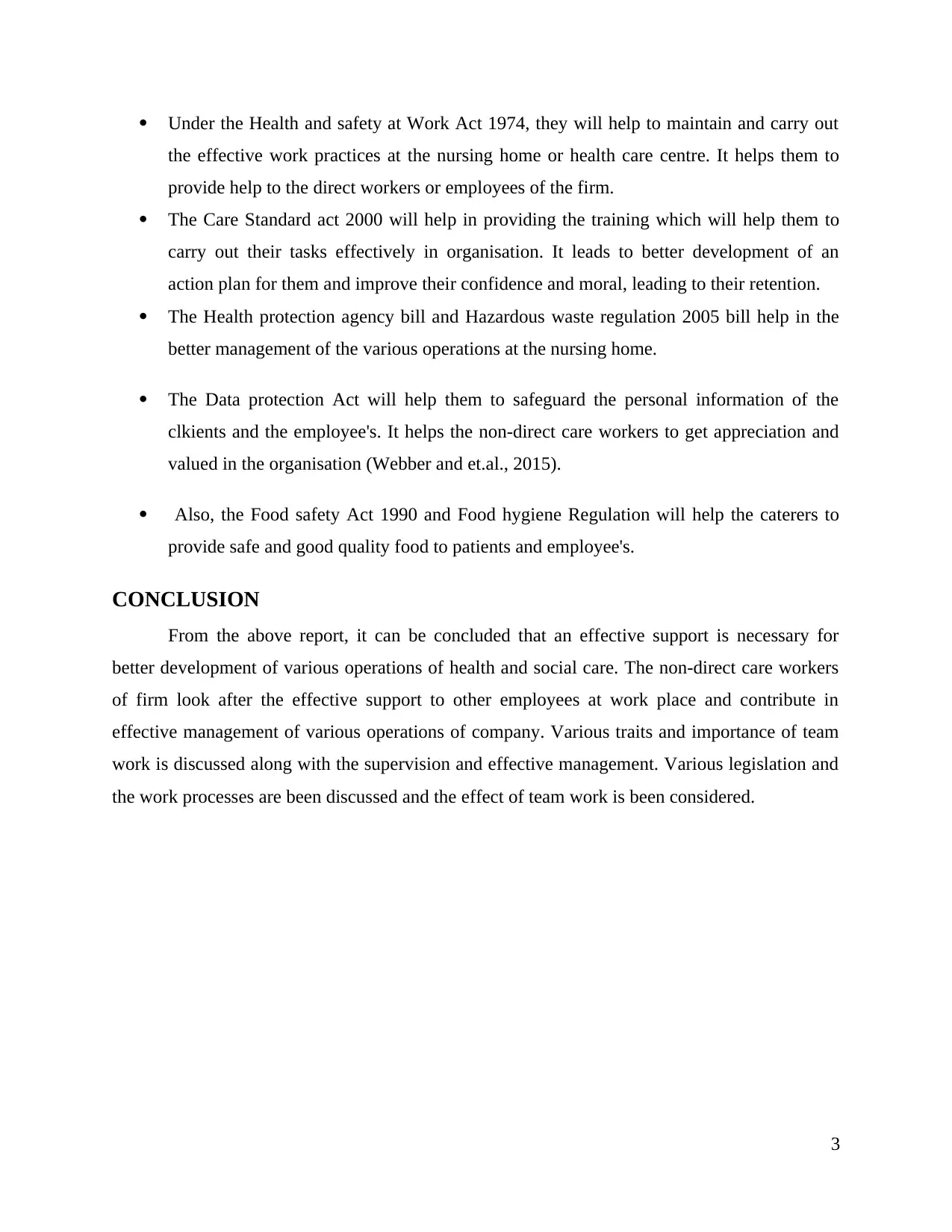
Under the Health and safety at Work Act 1974, they will help to maintain and carry out
the effective work practices at the nursing home or health care centre. It helps them to
provide help to the direct workers or employees of the firm.
The Care Standard act 2000 will help in providing the training which will help them to
carry out their tasks effectively in organisation. It leads to better development of an
action plan for them and improve their confidence and moral, leading to their retention.
The Health protection agency bill and Hazardous waste regulation 2005 bill help in the
better management of the various operations at the nursing home.
The Data protection Act will help them to safeguard the personal information of the
clkients and the employee's. It helps the non-direct care workers to get appreciation and
valued in the organisation (Webber and et.al., 2015).
Also, the Food safety Act 1990 and Food hygiene Regulation will help the caterers to
provide safe and good quality food to patients and employee's.
CONCLUSION
From the above report, it can be concluded that an effective support is necessary for
better development of various operations of health and social care. The non-direct care workers
of firm look after the effective support to other employees at work place and contribute in
effective management of various operations of company. Various traits and importance of team
work is discussed along with the supervision and effective management. Various legislation and
the work processes are been discussed and the effect of team work is been considered.
3
the effective work practices at the nursing home or health care centre. It helps them to
provide help to the direct workers or employees of the firm.
The Care Standard act 2000 will help in providing the training which will help them to
carry out their tasks effectively in organisation. It leads to better development of an
action plan for them and improve their confidence and moral, leading to their retention.
The Health protection agency bill and Hazardous waste regulation 2005 bill help in the
better management of the various operations at the nursing home.
The Data protection Act will help them to safeguard the personal information of the
clkients and the employee's. It helps the non-direct care workers to get appreciation and
valued in the organisation (Webber and et.al., 2015).
Also, the Food safety Act 1990 and Food hygiene Regulation will help the caterers to
provide safe and good quality food to patients and employee's.
CONCLUSION
From the above report, it can be concluded that an effective support is necessary for
better development of various operations of health and social care. The non-direct care workers
of firm look after the effective support to other employees at work place and contribute in
effective management of various operations of company. Various traits and importance of team
work is discussed along with the supervision and effective management. Various legislation and
the work processes are been discussed and the effect of team work is been considered.
3
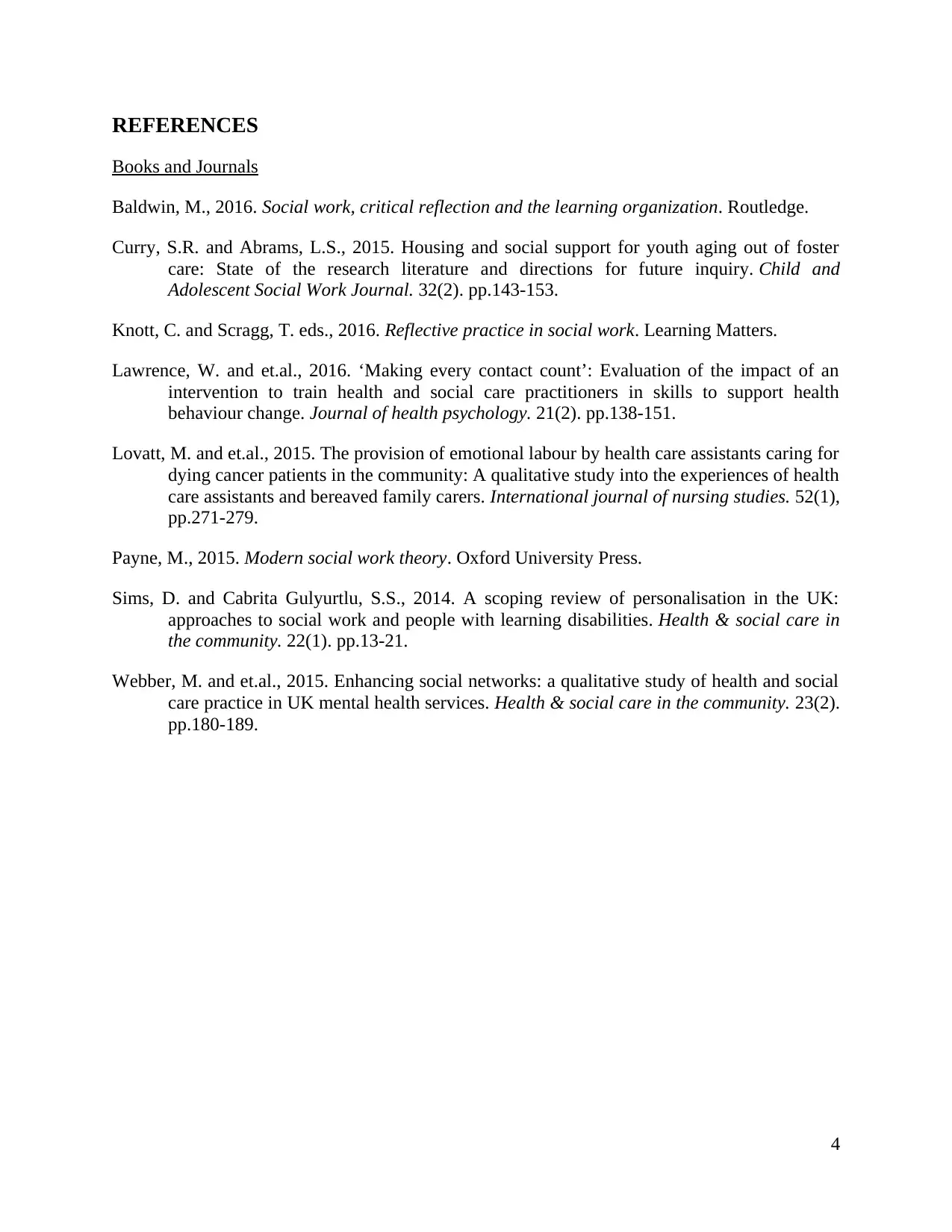
REFERENCES
Books and Journals
Baldwin, M., 2016. Social work, critical reflection and the learning organization. Routledge.
Curry, S.R. and Abrams, L.S., 2015. Housing and social support for youth aging out of foster
care: State of the research literature and directions for future inquiry. Child and
Adolescent Social Work Journal. 32(2). pp.143-153.
Knott, C. and Scragg, T. eds., 2016. Reflective practice in social work. Learning Matters.
Lawrence, W. and et.al., 2016. ‘Making every contact count’: Evaluation of the impact of an
intervention to train health and social care practitioners in skills to support health
behaviour change. Journal of health psychology. 21(2). pp.138-151.
Lovatt, M. and et.al., 2015. The provision of emotional labour by health care assistants caring for
dying cancer patients in the community: A qualitative study into the experiences of health
care assistants and bereaved family carers. International journal of nursing studies. 52(1),
pp.271-279.
Payne, M., 2015. Modern social work theory. Oxford University Press.
Sims, D. and Cabrita Gulyurtlu, S.S., 2014. A scoping review of personalisation in the UK:
approaches to social work and people with learning disabilities. Health & social care in
the community. 22(1). pp.13-21.
Webber, M. and et.al., 2015. Enhancing social networks: a qualitative study of health and social
care practice in UK mental health services. Health & social care in the community. 23(2).
pp.180-189.
4
Books and Journals
Baldwin, M., 2016. Social work, critical reflection and the learning organization. Routledge.
Curry, S.R. and Abrams, L.S., 2015. Housing and social support for youth aging out of foster
care: State of the research literature and directions for future inquiry. Child and
Adolescent Social Work Journal. 32(2). pp.143-153.
Knott, C. and Scragg, T. eds., 2016. Reflective practice in social work. Learning Matters.
Lawrence, W. and et.al., 2016. ‘Making every contact count’: Evaluation of the impact of an
intervention to train health and social care practitioners in skills to support health
behaviour change. Journal of health psychology. 21(2). pp.138-151.
Lovatt, M. and et.al., 2015. The provision of emotional labour by health care assistants caring for
dying cancer patients in the community: A qualitative study into the experiences of health
care assistants and bereaved family carers. International journal of nursing studies. 52(1),
pp.271-279.
Payne, M., 2015. Modern social work theory. Oxford University Press.
Sims, D. and Cabrita Gulyurtlu, S.S., 2014. A scoping review of personalisation in the UK:
approaches to social work and people with learning disabilities. Health & social care in
the community. 22(1). pp.13-21.
Webber, M. and et.al., 2015. Enhancing social networks: a qualitative study of health and social
care practice in UK mental health services. Health & social care in the community. 23(2).
pp.180-189.
4
⊘ This is a preview!⊘
Do you want full access?
Subscribe today to unlock all pages.

Trusted by 1+ million students worldwide
1 out of 6
Related Documents
Your All-in-One AI-Powered Toolkit for Academic Success.
+13062052269
info@desklib.com
Available 24*7 on WhatsApp / Email
![[object Object]](/_next/static/media/star-bottom.7253800d.svg)
Unlock your academic potential
Copyright © 2020–2026 A2Z Services. All Rights Reserved. Developed and managed by ZUCOL.





